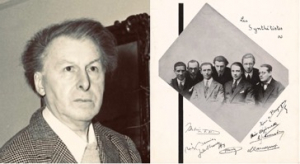#215– September 04, 2023

René Bernier and The Synthetists
https://www.youtube.com/watch?v=w9F-X4trnPM
Épitaphe II, by Belgian composer René Bernier is our Composition of the Week.
During the coming summer weeks, we are presenting Belgian literature for wind orchestra by Paul Gilson and a group of his students who, in September 1925, joined their creative forces to form the first group of composers in Belgian history, called the Synthetists.
The music they produced constitutes an unavoidable historical heritage of the early 20th century.
This fresh and imaginative repertoire, of great artistic quality, remains curiously and unjustly unknown.
Bernier composed his first Épitaphe for Brass only, in 1923 (other scholars say 1927) as music for the unveiling of a monument in honor of the victims of the war, in the cemetery of his native town Saint-Gilles, with the original title of Prélude élégiaque.
It was performed by the Belgian Guides under Arthur Prevost during a concert of The Synthetists in 1931.
Later, in 1945, Bernier writes a version for symphony orchestra called Épitaphe Symphonique and dedicates the music to his deceased father.
Épitaphe II written in 1961 is the reworked version for full band of that work.
“Épitaphe II is a brief, melancholic lament infused with harsh, emotional accents and contrasts. The dark funeral march in the muted brass and snare drum is commented on by the special, deep sounds of the contrabassoon, bass saxophone and double bass. In the second part, the woodwinds play with intimate lyricism, in a refined and impressionistic chamber music style.” (Program notes by the editor)
Épitaphe II is scored for full Wind Ensemble, including contrabassoon, bass saxophone, double bass, 3 cornets and 3 trumpets parts, harp, celesta and 3 percussion parts.
It has a duration of 5 minutes.
The music is available at Band Press, Belgium.
A pupil of Paul Gilson, René Bernier was the youngest member of The Synthetists”. He taught at the conservatories of Liège and Mons from 1946 to 1968, he was also an inspector of French-language musical education, winning numerous composition prizes and sitting on various national and international juries, and enjoying great renown in Belgium and France. Already, as a young composer, he had the honor of being encouraged by artists such as Albert Roussel. He was clearly a representative of Latin and French-speaking culture. His father was of Franco-Walloon origin and his mother had Swiss origins.
Bernier became a member of the Académie Royale and in 1983, he was awarded the SABAM prize for classical music.
“He has been described as the ‘most French composer’ of his generation, and composed along the lines of Debussy, Ravel and Poulenc. His music is characterized by elegance and charm, attention to subtle nuances and a great inner lyricism.” (Notes from the Naxos Album, « The Synthetists Revisited »)
Other works for winds include:
- Mélodies brèves, for solo voice and winds (1930)
- Blues Rhapsodique (manuscript, property of the Belgian Guides library)
- Hymne de Paix (1950)
- Le Tombeau devant l’Escaut (1962), transcribed for wind orchestra by Jules Semler-Collery
- Danses Parodiques (1956/1970) transcribed for wind orchestra by Simon Poulain.


